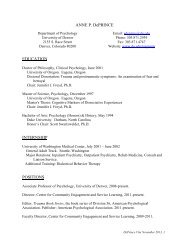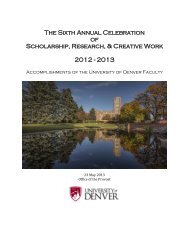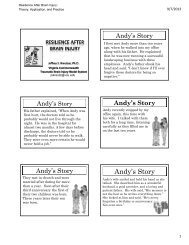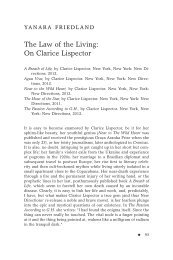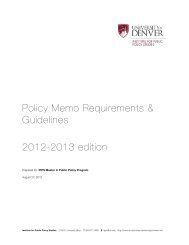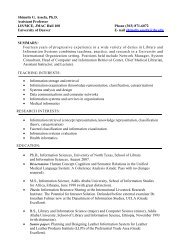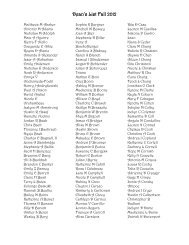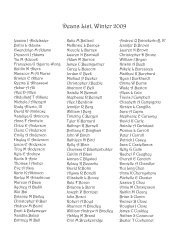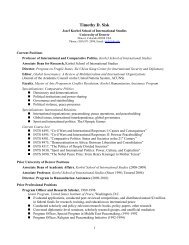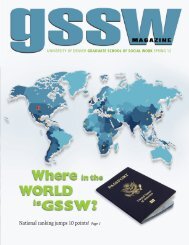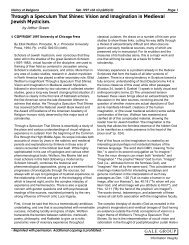Chien-Kai Chen, “China and Taiwan: A Future of Peace? A Study of ...
Chien-Kai Chen, “China and Taiwan: A Future of Peace? A Study of ...
Chien-Kai Chen, “China and Taiwan: A Future of Peace? A Study of ...
You also want an ePaper? Increase the reach of your titles
YUMPU automatically turns print PDFs into web optimized ePapers that Google loves.
China <strong>and</strong> <strong>Taiwan</strong>: A <strong>Future</strong> <strong>of</strong> <strong>Peace</strong>? - 18<br />
Chinese in <strong>Taiwan</strong>. Since <strong>Taiwan</strong>’s 2000 presidential election in which <strong>Chen</strong> Shui-Bian, the DPP<br />
c<strong>and</strong>idate who supported <strong>Taiwan</strong>ese nationalism, was elected, <strong>Taiwan</strong>’s domestic politics has<br />
been dominated by two political forces: “Pan-Green,” which consists <strong>of</strong> the DPP politicians as<br />
well as Lee Teng-Hui <strong>and</strong> his political followers who left KMT <strong>and</strong> established a new political<br />
party named <strong>Taiwan</strong> Solidarity Union (TSU); <strong>and</strong> “Pan-Blue,” which includes the KMT<br />
politicians who forced Lee Teng-Hui to leave KMT in 2000, <strong>and</strong> the politicians in People First<br />
Party (PFP) – which was established by a politician who disagreed with Lee Teng-Hui’s political<br />
position. The core <strong>of</strong> the conflict between China <strong>and</strong> <strong>Taiwan</strong> is now seen differently by different<br />
political forces in <strong>Taiwan</strong>: while Pan-Green regards the conflict as an international conflict<br />
between Chinese <strong>and</strong> <strong>Taiwan</strong>ese, Pan-Blue regards it as a domestic conflict between the Chinese<br />
in mainl<strong>and</strong> China <strong>and</strong> in <strong>Taiwan</strong>.<br />
This new situation in <strong>Taiwan</strong>’s domestic politics has a large effect on the development <strong>of</strong><br />
China-<strong>Taiwan</strong> relations. It leads China to develop a dual attitude towards <strong>Taiwan</strong>, <strong>and</strong> the U.S. to<br />
apply a dual strategy regarding the issue <strong>of</strong> cross-strait relations. Given that Pan-Blue’s position<br />
on China-<strong>Taiwan</strong> relations (cross-strait relations are the “domestic” relations between the<br />
“Chinese” in mainl<strong>and</strong> China <strong>and</strong> the “Chinese” in <strong>Taiwan</strong>) implicitly indicates China-<strong>Taiwan</strong><br />
unification, <strong>and</strong> that Pan-Green’s position (the cross-strait relations are the “international”<br />
relations between “Chinese” <strong>and</strong> “<strong>Taiwan</strong>ese”) implicitly rejects unification, China has become<br />
increasingly friendly to Pan-Blue <strong>and</strong> increasingly aggressive to Pan-Green. Before the 1990s,<br />
the United States had to deter China from militarily attacking <strong>Taiwan</strong>. However, given the fact<br />
that <strong>Taiwan</strong>ese identity has been emerging since the 1990s <strong>and</strong> many <strong>Taiwan</strong>ese leaders since<br />
then have promoted <strong>and</strong> supported <strong>Taiwan</strong>ese identity (e.g., Lee Teng-Hui <strong>and</strong> <strong>Chen</strong> Shui-Bian),<br />
the U.S. now has to apply a dual strategy to deal with the cross-strait issue: militarily deterring<br />
China from attacking <strong>Taiwan</strong>, while politically deterring <strong>Taiwan</strong> from declaring independence<br />
(Christensen 2001, 34-38).<br />
To recapitulate, <strong>Taiwan</strong>’s domestic political development during the 1990s resulted in the<br />
emergence <strong>of</strong> <strong>Taiwan</strong>ese nationalism <strong>and</strong> in turn led to the emergence <strong>of</strong> two political forces in<br />
<strong>Taiwan</strong>’s domestic politics: the force <strong>of</strong> pro-<strong>Taiwan</strong>ese nationalism currently represented by Pan-<br />
Green, <strong>and</strong> the force <strong>of</strong> pro-Chinese nationalism currently represented by Pan-Blue. Here, what<br />
should be emphasized is that the outcome <strong>of</strong> the political conflict between these two forces in<br />
<strong>Taiwan</strong>’s domestic politics would have a critical effect on the China-<strong>Taiwan</strong> relations <strong>and</strong> the<br />
relations in the <strong>Taiwan</strong> Strait. The most dangerous prospect affecting peace in the <strong>Taiwan</strong> Strait<br />
is either a Chinese attack against <strong>Taiwan</strong> without <strong>Taiwan</strong>’s provocation, or a <strong>Taiwan</strong>ese<br />
provocation that triggers a justified Chinese attack. The former danger is unlikely to occur given<br />
that, according to Robert Ross (2002, 63-71), without <strong>Taiwan</strong>’s provocation China can be<br />
effectively deterred from attacking by the U.S. because China realizes an American intervention<br />
is both capable <strong>and</strong> credible. As for the latter danger (a Chinese attack because <strong>of</strong> <strong>Taiwan</strong>’s<br />
provocation), this is believed to be the most important factor that could lead to a war in the<br />
<strong>Taiwan</strong> Strait. According to Scott Kastner (2006, 351), “the danger <strong>of</strong> war in the <strong>Taiwan</strong> Strait<br />
arises primarily from a willingness <strong>of</strong> <strong>Taiwan</strong>’s leaders to test Beijing’s ‘redline,’ the point at<br />
which Mainl<strong>and</strong> leaders would rather fight a war than accept a certain level <strong>of</strong> <strong>Taiwan</strong>ese<br />
sovereignty.” From this point <strong>of</strong> view, <strong>Taiwan</strong>’s domestic politics plays a key role in the relations<br />
between China <strong>and</strong> <strong>Taiwan</strong>. Specifically, given that <strong>Taiwan</strong>’s president has large constitutional<br />
power to deal with issues concerning national security, foreign affairs <strong>and</strong> cross-strait relations,<br />
which political force wins <strong>Taiwan</strong>’s presidential elections matters a great deal. If a pro-<strong>Taiwan</strong>ese<br />
identity politician wins the presidential election, the likelihood <strong>of</strong> the danger cited by Scott



